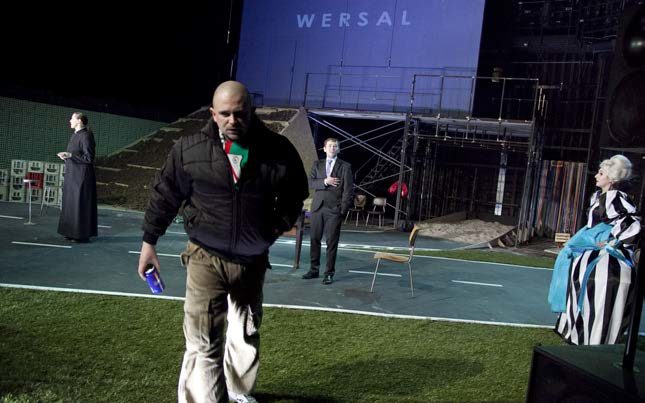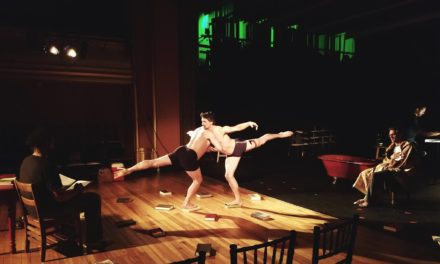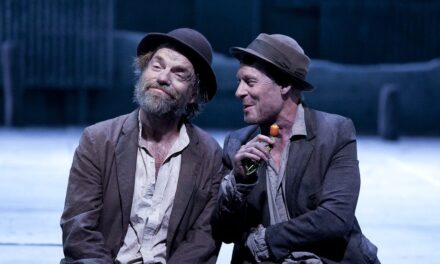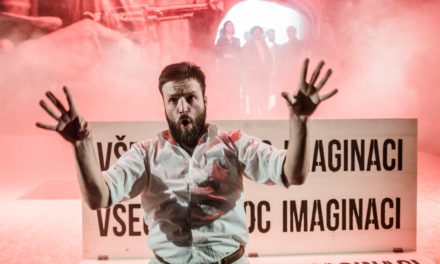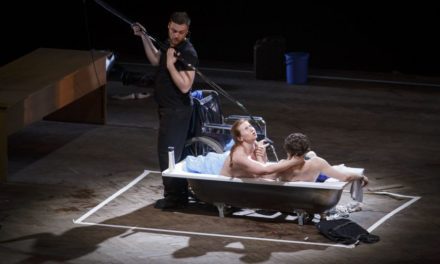In an interview following Strzępka and Demirski’s receipt of the Polityka Passport Pawel Demirski suggested that many would surely like to see their work in an off theatre, independent and non-institutionalized–to channel (we might suppose) their rebellious power into subversive and outspoken activities in the public and institutional space.
I recall this because Rainbow Stand 2012 seems based on a similar tension–between mainstream and off, between what can be shown and demonstrated in the framework of culture, the public space, and the everyday, real-life dirt that has no place there. This performance enacts its meaning in a parceled miniature of civic space, in whose framework–depending on one’s position in society–the rights to visibility, participation, and voice in public debate are shared. Rainbow Stand 2012 relentlessly attempts to expose and contemplate a never entirely innocent nor objective situation belonging to a defined class or cultural code. Yet we also could (or perhaps should) look at Rainbow Stand 2012 in the framework of public and political discourse, a manifestation of critical art, a voice in a debate. And here the problem starts. As a performance, Rainbow Stand 2012 does a very interesting job of enacting issues concerning the limits of performing one’s identity, it splendidly overturns codes of representation and is simply very well done, a play that opens one’s eyes at many points. But in social categories, the play is a statement in a debate that seeks to bring about social change; as a project it is, of course, informative, raising numerous problems to be discussed at once, but misguided in an important (perhaps the most important) part. And an interesting springboard to discussing the real possibilities of political theater.
Perhaps the strongest such tension (and a problem in terms of evaluation–in strictly theatrical and social terms) is rendered by a crucial question in Rainbow Stand 2012, concerning the place from which the public debate is spoken. The spatial solutions appear to expose the problematically “subversive” strategy of the artists. The performance is played on the Jerzy Grzegorzewski Stage at the Polski Theater in Wrocław, but it does not use the venue according to the structure suggested by the building’s architecture. Everyone (the actors and audience) is placed in the depths of the stage, to one side, separated from the rest of the theater by a wall of Plexiglas. The front of the stage and the actual audience area are empty almost the entire time (and if they are used, it is always abiding by this border), but in one of the opening scenes of Rainbow Stand 2012 the frontal space is used in a significant fashion. It is there, on the large “real” stage that a parody of the opening of Krzysztof Warlikowski’s Cleansed is played.
If we consider this arrangement from a theatrical point of view, it shows the relationships between the mythologized, idealized representations of gay love in high culture and the real problems, with all their dirt and grime, that can accompany a coming out (homosexual and otherwise) in a brilliant, condensed fashion. As if from behind the poetic, oneiric, staged frontal image all the difficulties, helplessness, and humiliation of the reality poured out from the back of the stage, where we are sitting, a show of the unprivileged (materially or socially) people, and the price they might have to pay: exclusion, mockery, or being regarded as a nut.
If, however, we look at this solution as a social signal, sent to the audience (intentionally? unintentionally?) along the way, the effect is unintentionally comic. Located in the dead center of town, the most recognizable Polish theater artists at the moment (Rainbow Stand 2012 is perhaps the only play about which the liberal Fakty TVN shot material for its main program, and several days before the premiere there was a major interview with the artists in Duży Format, a supplement to the equally liberal Gazeta Wyborcza) have built a kind of conspiratorial partisanship, an “off” backroom, establishing the outskirts of high culture on the stage of the Polski Theater. Libertine (not to say “liberal”) jokes, like the grotesque concept, which fits nicely into the play of liberal power–a performance for Euro 2012, a “reconstruction of system changes,” recreating the roles of “boys from the Independent Students’ Association.”
We too gave it a standing ovation:
All this might be a self-reflexive strategy or a witty, metaphorical shorthand for the problems with revolutionary and subversive work from within a cultural institution, but it leads us to what is perhaps a more serious issue. The audience is seated to the back of the stage, thus creating a community of those who are outside of the mainstream, beyond the great and remote stage of politics, in the wings of the discourse; in a word, the excluded. The audience clearly feels comfortable in such a situation, because the way we are situated means there is no attempt to undermine our position: It is not the back of the stage that is attacked, but the space in front, while the back is a shelter for various positions. In a theater as socially engaged as that of Strzępka and Demirski, the message and the designed reception are just as important as the real resonance, for which the artists are, to some extent, responsible. This not only concerns the fact that applause rang out after almost all the major issues were raised (perhaps because I saw the premiere), which were often ideologically contradictory but also the repercussions in the public sphere, which is, after all, what this is all about. As some said following the play, it stands in utter contradiction to the artists’ revolutionary intentions (one opinion is certain to catch on: Demirski and Strzępka support the initiative to organize Rainbow Stand 2012 at the Euro 2012), however enthusiastic it may be. Why are people so eager to support such a “controversial” play?
The problem again, paradoxically, appears to be tied to the theatrical attractiveness and complexity of Rainbow Stand 2012: the multiplication of points of view, the show of the multifarious problems of “being a fag,” the constant undermining of standpoints that lead neither to raising responsibility for the social space, nor to any kind of discomfort (in the audience or artists). Quite the contrary–they dulled the blade of the statements, disoriented, and cautiously blurred things because they universalized the specifics of the problem.
Inspired by a particular initiative, Rainbow Stand 2012 branches into a whole spectrum of subjects–from the main issue to the limits of democracy, through liberal authority, the utopia of the Euro 2012 championship, historical politics and the capacity for revolution, to questions of national identity, football, the position of gays and football fans in society, and then–inscribed in the framework of Rainbow Stand 2012 construction–the social repercussions of high or mainstream culture and the reproduction of the models it transmits.
If one should happen to be rather indifferent to gay issues, one will find general complaints in the play about the terrible bureaucratic machine; everyone, after all, is a bit harmed by the “system,” everyone has “gripes,” the authorities are dreadful, obviously, and we all, in a surprisingly single-minded community, sit to one side of the great political scenes being performed near us. Everyone has their own claim to exclusion.
It is hard to concede to such a community of the excluded (the “fags” of the Polish public space): it dissolves the problem, without provoking even the slightest intervention. Incidentally, at one moment the actor playing one of the gays passes round to the audience a paper to send to Premier Tusk, a petition supporting the Rainbow Stand 2012; the paper is ostentatiously distributed, the gesture is a powerful one, and serious, but the petition vanishes in the theater audience, and later on, no one wonders at its absence.
In searching for a response to why this revolutionary play is so unrevolutionary, Peter Handke’s analysis and criticism of Brecht’s theater might come to our aid. Shock methods, he claimed, have to be one-time only to indeed take effect; exposing and undermining become as easy as all other repeated methods, an aesthetic rule which the audience swiftly learns (maybe as swiftly as Warlikowski’s “fucking oneiric lights” attacked in Rainbow Stand 2012?) and to which they even more swiftly become accustomed, recognizing it as theirs and thus remain in a pleasant state that numbs disquiet and the need to act. And finally–we are perhaps better off offending a concrete audience and making them unsure of their position than striking out at remote and mythical evil “others.”
What are the Cleansed cleansed of?
And now, with some relief, let us return to the theater, and aesthetic satisfaction. Here, in what we might call, strictly speaking, the theatrical frame (and the references and allusions circumscribed by the theatrical space), much more interesting things occur in Strzępka and Demirski’s play.
Abiding by their creative strategy to date, Demirski and Strzępka adopt a definite technique (“all too familiar,” but this time–we ought to note–not to the wide public, but to an elite theater crowd, participants in high culture), a recognizable myth, to warp it into a paraphrase, tear it apart, untune it, to extract the issues, premises, and the thought patterns it conceals.
The basic point of reference in Rainbow Stand 2012 would seem to be the work of Krzysztof Warlikowski, not just as a director preoccupied with exclusion and the homosexual identity (in Cleansed and Angels in America), but also as a figure of the high cultural elite and the untouchable establishment, the pet of the authorities, as personified by the Mayor. A person whose social position makes his sexual orientation (and its manifestation) palatable, almost transparent, who is able to frame his experiences in metaphysical and psychoanalytical categories, far from the grime of bureaucracy, humiliation, and powerlessness of unprivileged gays, from petitions, from going around to MPs and struggling with office workers and authorities. The attack on Warlikowski is surely, to a large extent, unjust – when Cleansed premiered in Poland it was an important performance with a rather difficult, murky, and uncomfortable role, while Demirski sets his sights on the production at a time when the blasé “Warlikowski actor” in Rainbow Stand 2012 can nonchalantly ask, “How many times have we seen this cult performance?” But it is not justice we are after, rather the status of a generation-defining and iconic work, of a piece that has been labeled (by the audience, not the artists themselves) a “theatrical experience.”
The relationship between Rainbow Stand 2012 and Cleansed is key: the scene parodying the monologue from Kane’s Crave performed by Renate Jett not only practically opens the Wrocław performance, but repeatedly flips into reflections, paraphrases, and parodies, as a figure of the idealized, mythologized (“oneiric lights”) exclusion and a falsified cultural model of representation. It looks as if the Warlikowski play behind the Plexiglas had suddenly opened to show what lay behind it as if the idealistic beauty (summarized in a few over-aesthetic signifiers) had cracked, opening the ulcer of real coming-outs of those excluded (through various, and not necessarily homosexual discourses) from the public space. The frontal facade of high culture cracks, and at the back of the Wrocław stage the distant poor relatives of the protagonists of Cleansed and Angels In America spill out: a group of idealistic gays, attempting (on the one hand) to deal with this model, which explains the play’s numerous scenes of “aspiring” to a higher class of gays and to defeat this tension, this inability to fit in, and the somewhat comical attempts of the artistic bohemians, the drag queen parties, the bright-red pop-art couch inserted in a glum and messy space, and karaoke versions of numerous rebellious punk rock songs.
On the other hand, because of the Cleansed sub-plot and the aspirations it introduces, they are consumed by a humorous Romanticism at many points, one that has been lost in Poland’s public space. Leading this group is Waiter (Marcin Pempuś), whose almost Romantic tirades inspire action, and who forever confronts sad, pitiful helplessness–a gay man who is seduced and attracted by the (in this case) destructive force of Cleansed. The upshot we might easily predict: as in a political fiction, or historical fantasy, we ride into the future–we have an idealistic about-face, and the authorities cynically ascribe the self-incineration of the members of the Rainbow Stand 2012 initiative to being part of the opening ceremonies of the National Stadium. The work of Warlikowski, as a figure of a cultural stereotype, seems to be accused of reproducing a cultural model that is not only false and clashes with reality, but can staunch any possible revolt–either through being locked in a structural framework, or through its inwardness, its becoming introverted, its “sensitive” closure within its traumas, in an “avenue of private frustrations.” And sitting “in front of Youtube after a fourth beer” listening to “songs from high school,” and tagging each of them with “it makes a tear come to my eye.”
What does “national” mean, anyway?
This problem with representation, aestheticization, and superficial, destructive myths is found in just about everyone in this odd country and appears in Rainbow Stand 2012. In the very functional space, brilliantly arranged by Michał Korchowiec, we find a microcosm of a divided Poland: a small tribunal covered in clay that also recalls the national mounds, to one side a bit of football turf, and in the center is initially a strip of an aborted, lost highway, though it is easily changed in various ways, creating the interior of a gay club throughout the room, stretching to the “real” audience of the Polski Theater.
This final element shows the clash, the moment when the themes introduced by Strzępka and Demirski (with the one addressed by Warlikowski’s work – high culture and reflecting on the nation) join: it is also a piece of the roads Poland diligently built before the Euro 2012 Championship, dead-ends, streets going nowhere (democracy?). In this sign we can also find an incidental allusion to an exhibition at the National Museum in Krakow – American Dream – whose images of freedom, the myths, and fantasies spun in Socialist Poland, included an almost identical strip of road to nowhere as the main piece of set design.
A great deal is said about this exotic nation, its communal life, and its transformation into theater in the projection that opens Rainbow Stand 2012: a fast-paced, powerful montage combining various manifestations and representations of our public space–various freeze-frames appear to the beat of an energetic Jamala reggae tune (Revolutions): Jesus de Świebodzineiro, a gay parade, football fans rioting, clashing with a repeating image of a smiling Premier Tusk, signing the contract for the Euro 2012…
The problem of those represented in society and the powers and means of their representation, the strong theatrical issues involved, is linked to the subject of the gay initiatives for democracy and a civic society.
This kind of authority–staged, stripped of reality and taken from an utterly different mode of theater–is the figure representing the ruling powers in Poland: the mayor of the capital city (Jolanta Zalewska), living in Versailles, dressed in a Baroque dress and crinolines, detached from all direct experience, dirt, and life. The cynicism and hypocrisy personified by the Mayor played out in numerous scenes of caprice, boredom, disdain for all civic initiatives, is nonetheless a superficial, black-and-white solution, which detracts from any potential complex ruminations on the subject of Polishness (represented in the projection that opens the play). This strategy shifts the focus onto a more general coming-to-terms, demanded by all (who, after all, go to create this odd country with its exotic manifestations of public life) from the summary and superficial crushing effect of liberal power. There may seem to be a greater problem in how the concrete grassroots civic initiative (Rainbow Stand 2012) is exploited and overwhelmed by the national issue (with a supposed presumption: this is most important to Poles!). To such a degree that one might watch Rainbow Stand 2012 not as a “gay” play (in spite of all the gay figures in public discourse that Strzępka and Demirski keep introducing), but–as the first voices following the premiere indicate–as another “Polish self-portrait,” again raising the issue which, now rendered in general terms, scarcely differs either from systemic generalities about the everyday troubles and complications that “normal” people face, or from the introverted, frustrated revolts which the artists seem to attack. And yet the strategy of exploiting and universalizing the theme of the Rainbow Stand 2012 recalls that applied by high culture, with its reproductions of inapplicable models: a superficial, idealistic generalizing structure replaces the painful facts and the real site of the conflict.
There was some concern that the Wrocław audiences in the ticket lines would not be able to swallow the title.
And here we ought to return to the original problem: in an interview preceding Rainbow Stand 2012 Monika Strzępka mentioned that the play was meant to have a different title–I Want You Out Of My Sight, Faggot, but the idea was abandoned. This title has some subversive potential, foregrounding the complex figure of gayness as a position in the framework of public space, instead of (for example) the subject of Polishness that is addressed here. It also alludes to the controversial strategy adopted by Betlejewski, which presents real critical difficulties and has been widely discussed in the media, and which in the first phase of his I Miss You, Jew project sought to disenchant, to change the Polish language associations with the word Żyd [Jew] (a mandatory feature in the stairwells of many Polish low-income housing blocks, and on outside walls, a repetition which gives it a negative subconscious connotation), which sounds like a slur, particularly in Polish stadiums. It is alternated with another word, at any rate: pedał [fag]. We can imagine the Strzępka and Demirski play that never was–I Want You Out Of My Sight, Faggot–as a less diffuse effort, not focused on being “off,” in the wings of high culture, through a kind of arbitrary gesture; perhaps braver, a truly subversive and uncomfortable version of Rainbow Stand 2012. And we can only regret that it was not made.
Polski Theatre in Wrocław
Paweł Demirski
Rainbow Stand 2012
direction and light design: Monika Strzępka,
set and costumes: Michał Korchowiec,
video: Jacek Zachodny,
music: Jan Suświłło,
choreography: Rafał Urbacki,
premiere: March 5, 2011
This article was originally published in Didaskalia in 2012 and has been reposted with permission.
This post was written by the author in their personal capacity.The opinions expressed in this article are the author’s own and do not reflect the view of The Theatre Times, their staff or collaborators.
This post was written by Joanna Jopek.
The views expressed here belong to the author and do not necessarily reflect our views and opinions.

